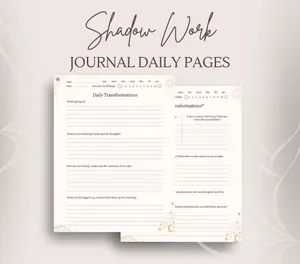
Unlocking the Depths Within
100 SHADOW WORK JOURNAL PROMPTS FOR AWARENESS, HEALING, GROWTH, AND EXPANSION
Embarking on the path of self-discovery often involves traversing the intricate landscapes of our inner selves. One transformative avenue of exploration is shadow work – a profound process of confronting and integrating the aspects of ourselves that dwell in the shadows of our consciousness. These hidden facets, often born from unresolved experiences, fears, or suppressed emotions, can profoundly impact our lives.
Shadow work is not merely an acknowledgment of our dark corners but a courageous quest to illuminate and understand them. By shining a light on our shadows, we gain insight into our subconscious patterns, unravel the roots of limiting beliefs, and open the door to profound personal growth.
Within the realm of shadow work, the practice of journaling emerges as a valuable companion. Through the written word, we create a reflective surface that illuminates the intricate depths of our psyche, providing a compass to navigate the twists and turns of our thoughts and emotions. This article delves into the essence of shadow work, presenting a thoughtfully crafted compendium of 100 journal prompts meticulously designed to accompany you on your introspective journey. Each prompt acts as a unique key, unlocking various chambers within your inner world. As you engage with these prompts, you are invited to not only explore but also embrace, heal, and integrate the shadows that intricately shape the narrative of your self-discovery.
Understanding Shadow Work
What is Shadow Work
Shadow work is a journey into the parts of ourselves that often remain hidden, residing in the shadows of our awareness. It involves facing and embracing the aspects of our personality, experiences, and emotions that we may have pushed aside or suppressed. These shadows hold valuable insights into our fears, insecurities, and untapped potentials.
When we delve into the realm of shadow work journaling, we're essentially translating this exploration onto the pages of our personal journal. It involves a journey of self-reflection through the act of writing—a valuable tool aiding us in uncovering and comprehending the shadows that reside within. This approach establishes a secure and confidential space for the articulation of our thoughts, emotions, and experiences, crafting a tangible documentation of our inner world.
Imagine your journal as a trusted friend, who's willing to patiently listen and hold space for you and your thoughts and feelings. As you engage in shadow work journaling, you begin to unravel the layers of your psyche, gaining clarity on patterns, behaviors, and emotions that may have been influencing your life from the shadows. It's a gentle yet profound way to foster self-awareness, acceptance, and personal growth. So, let's delve into the heart of shadow work journaling, unlocking the doors to self-discovery through the power of the written word.
Exploring the Shadow Side - Shadow Self
Within each person lies a shadow side—a realm of unacknowledged facets that influence thoughts, behaviors, and interactions. These shadows, often shaped by past experiences, societal influences, or unexpressed emotions, can manifest in various forms.
How Your Shadows May Show Up In Your Life
Unresolved Trauma: Past traumas may cast shadows, affecting emotional responses and decision-making. Unaddressed experiences can lead to patterns of avoidance or unhealthy coping mechanisms.
Suppressed Emotions: Emotions deemed unacceptable or uncomfortable may lurk in the shadows. Anger, shame, or sadness, when pushed aside, can influence relationships and self-perception.
Limiting Beliefs: Deep-seated beliefs about one's worth, capabilities, or deservingness can create shadows. These beliefs may hinder personal growth and success.
Projection: Shadows often manifest through projection — attributing one's own unacknowledged traits or emotions to others. Recognizing projection requires self-awareness.
Download FREE SHADOW WORK JOURNAL PAGES
How To Identify Your Shadows
Understanding and identifying shadows within oneself is a nuanced process that involves keen observation and introspection. Here's a helpful guide to recognizing shadows:
Patterns of Reactivity: Take note of recurring emotional reactions or behavioral patterns that appear disproportionate to the situation. These could be signals that shadows are seeking acknowledgment and integration.
Triggers: Pinpoint situations or topics that evoke strong emotional responses. These emotional triggers often provide valuable clues about the areas where shadows may be residing.
Self-Reflection: Engage in regular self-reflection, examining your thoughts and actions with honesty. This introspective practice is a key tool for uncovering subtle shadows and gaining insights into their origins.
Feedback from Others: Seek feedback from trusted friends or mentors who may offer perspectives on patterns that might be elusive to your own awareness. Be attentive to recurring feedback about your behavior or reactions as it may reveal hidden aspects.Approaching shadow identification with openness and a willingness to explore can lead to profound self-discovery and personal growth.
What Feeds Your Shadows - Navigating Shadow-Driven Emotions
When the shadows within us take the wheel, our emotions often become a complex landscape to navigate. These suppressed or unnoticed aspects of ourselves can wield significant influence on our feelings. Here's a glimpse into the emotions people may commonly experience when shadows steer their lives:
1. Anxiety and Fear: Shadows often harbor unresolved fears or anxieties. When these shadows surface, feelings of unease, apprehension, or even panic may become prevalent.
2. Anger and Frustration: Unacknowledged shadows can manifest as simmering anger or frustration. Individuals may find themselves reacting with intensity, seemingly out of proportion to the situation.
3. Guilt and Shame: Shadows rooted in past experiences may evoke feelings of guilt or shame. These emotions can weigh heavily, affecting self-worth and contributing to a sense of unworthiness.
4. Sadness and Melancholy: Suppressed emotions and unresolved shadows can lead to bouts of sadness or a lingering sense of melancholy. This emotional weight may color various aspects of daily life.
5. Insecurity and Self-Doubt: Shadows often whisper messages of insecurity and self-doubt. Individuals may grapple with a pervasive sense of not being "enough" or feeling unworthy of success and happiness.
6. Isolation and Withdrawal: Shadows can foster a desire to withdraw from others. Individuals may feel an inclination to isolate themselves, creating a barrier as a means of self-protection.
Recognizing and grasping these emotions marks the initial stride in navigating the shadows. Illuminating these feelings empowers individuals to embark on the path of shadow work, progressively weaving these emotions into a tapestry that fosters a more balanced and authentic life.
Download FREE SHADOW WORK JOURNAL PAGES
100 Shadow Work Prompts for Healing and Growth
1. What is a fear or insecurity that I've never acknowledged?
2. Are there any childhood memories that still affect me today?
3. What negative beliefs about myself do I need to let go of?
4. Have I ever felt ashamed of a desire or aspiration? Why?
5. What emotions do I struggle to express or accept?
6. Is there a part of me that I hide from others? Why?
7. What unresolved conflicts or grudges do I hold onto?
8. Have I ever acted in a way that goes against my values? Why?
9. What aspects of my past relationships have I not processed?
10. Are there people I resent, and how does that affect me?
11. What are my deepest desires that I'm afraid to pursue?
12. Have I ever felt like an imposter in certain situations? When?
13. What self-destructive habits do I engage in, and why?
14. Are there parts of my identity that I've outgrown?
15. What am I most judgmental about in others, and why?
16. Have I ever silenced my intuition? What happened?
17. What unresolved grief or loss do I need to address?
18. What masks or personas do I wear to fit in or be accepted?
19. Are there aspects of my sexuality that I've repressed?
20. What do I need to forgive myself for?
21. What are my most vivid dreams trying to tell me?
22. How do I cope with stress, and are these coping mechanisms healthy?
23. Are there moments from my past where I felt powerless? How does that influence me today?
24. What role does guilt play in my decision-making process?
25. Do I have difficulty setting and maintaining boundaries? Why?
26. In what ways do I seek external validation, and how does it impact my self-worth?
27. What past achievements am I downplaying or dismissing? Why?
28. How do I handle rejection, and does it trigger deeper insecurities?
29. Are there cultural or societal expectations that I feel pressured to conform to?
30. What role does perfectionism play in my life, and how does it hinder me?
31. How do I react when someone criticizes or disagrees with me?
32. What childhood messages about money still influence my financial decisions?
33. In what situations do I struggle to assert myself, and why?
34. What do I believe about aging, and how does it impact my choices?
35. How do I navigate feelings of jealousy or envy? What triggers these emotions?
36. Are there patterns of self-sabotage in my life, and when do they arise?
37. What do I avoid confronting within myself, and why?
38. How do I handle failure, and what does it teach me about my self-worth?
39. What role does control play in my relationships, and how does it affect them?
40. Are there aspects of my body that I struggle to accept or embrace?
41. How do I define success, and does that definition align with my true values?
42. What do I need to release to make space for positive change in my life?
43. In what ways do I seek external validation, and how does it impact my self-worth?
44. How do I handle criticism, and does it trigger deeper insecurities?
45. What childhood messages about success and achievement still influence my mindset?
46. How do I respond to feelings of loneliness or isolation?
47. Are there patterns of self-neglect in my life, and when do they emerge?
48. What role does vulnerability play in my relationships, and do I struggle to be vulnerable?
49. How do I define love, and how does that definition impact my relationships?
50. Are there patterns of procrastination in my life, and what do they reveal about my fears?
51. What do I believe about my own worthiness of love and happiness?
52. How do I express anger, and are there healthy ways to channel this emotion?
53. In what areas of my life do I feel a lack of control, and how does it affect me?
54. What role do expectations play in my relationships, and do they lead to disappointment?
55. How do I handle change, and does resistance to change impact my growth?
56. Are there moments from my past where I felt truly seen and understood? How does that influence my present relationships?
57. What do I believe about my ability to create positive change in the world?
58. How do I cope with failure, and does it hinder my willingness to take risks?
59. In what ways do I numb or avoid difficult emotions, and what impact does it have on my well-being?
60. What is my relationship with time, and how does it influence my daily choices?
61. How do I react when someone sets boundaries with me, and what does it reveal about my respect for others?
62. What role does expectations play in my life, and do they lead to feelings of frustration?
63. How do I navigate feelings of unworthiness, and what triggers these emotions?
64. In what ways do I resist self-compassion, and how does it affect my ability to heal?
65. What past mistakes do I continue to punish myself for, and how can I offer forgiveness?
66. How do I define friendship, and do I struggle with feelings of betrayal?
67. Are there areas of my life where I feel a lack of fulfillment, and what changes can I make?
68. How do I respond to compliments, and does it reflect my ability to receive love?
69. In what situations do I feel the need to control outcomes, and how does it impact my peace of mind?
70. What role does faith or spirituality play in my life, and how does it influence my choices?
71. How do I navigate feelings of inadequacy, and what tools can I use to build self-confidence?
72. Are there moments from my past where I felt truly heard and validated? How does that impact my communication style?
73. What is my relationship with pleasure, and how does it influence my self-care practices?
74. In what ways do I prioritize the needs of others over my own, and how does it affect my well-being?
75. How do I respond to success, and does it trigger feelings of impostor syndrome?
76. What do I believe about my ability to create and sustain meaningful connections with others?
77. How do I handle confrontation, and are there healthy ways to express my needs?
78. What role does self-discipline play in my life, and how does it impact my goals?
79. In what ways do I seek escapism, and how does it influence my overall satisfaction?
80. What is my relationship with creativity, and how does it impact my ability to problem-solve?
81. How do I cope with endings, and what does it teach me about resilience?
82. Are there patterns of comparison in my life, and how do they impact my self-esteem?
83. What is my relationship with change, and how does it influence my ability to adapt?
84. How do I respond to feelings of overwhelm, and what strategies can I implement for balance?
85. In what situations do I feel the need to people-please, and how does it affect my authenticity?
86. What do I believe about my capacity for joy, and how does it impact my pursuit
87. How do I define beauty, and does that definition align with my true self?
88. Are there moments from my past where I felt truly proud of myself? How does that influence my self-esteem?
89. What do I believe about my ability to handle adversity and challenges?
90. How do I express gratitude in my daily life, and does it influence my overall well-being?
91. In what ways do I hold back in relationships, and what fears drive this behavior?
92. What is my relationship with material possessions, and how does it impact my sense of abundance?
93. How do I navigate feelings of regret, and what lessons can I extract from these emotions?
94. Are there aspects of my physical health that I neglect, and what changes can I make?
95. How do I define success in my career, and does that definition align with my true passions?
96. In what situations do I feel the need to be in control, and how does it impact my flexibility?
97. What role does play and leisure play in my life, and does it contribute to my overall happiness?
98. How do I define trust, and does past betrayal influence my ability to trust others?
99. What is my relationship with forgiveness, and how does it impact my ability to let go of the past?
100. How do I define balance in my life, and what adjustments can I make to achieve it?
Download FREE SHADOW WORK JOURNAL PAGES
By regularly working with shadow work prompts and questions like these, you can embark on a transformative journey of self-discovery, healing, and personal growth. Remember, your shadow side holds the keys to understanding and embracing your true self.
Use these journals for Shadow Work & Self Discovery:
DIGITAL SHADOW WORK JOURNAL
PRINTABLE SHADOW WORK JOURNAL
SELF-DISCOVERY AFFIRMATIONS JOURNAL
Copyright © Edgesavvy — ClaimBadAssYou journals. All rights reserved.

